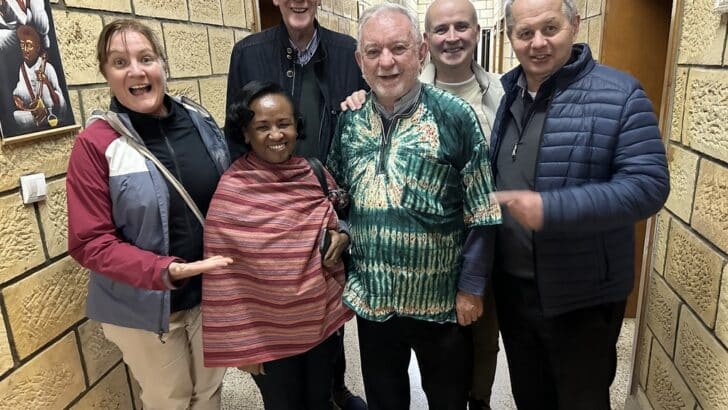Tigray, in the north of Ethiopia, is going through a recovery time from a war that lasted two years, from 2020 to 2022. The ‘Tigray War’ has resulted in one million deaths and several food shortages.
Last November, six Irish bishops accompanied representatives for Trócaire in a one-week visit to the country. This was the first official visit to the region of Tigray since the recent peace agreement.
The Irish delegation was composed of Trócaire CEO, Caoimhe de Barra, Trócaire’s Church Manager, Jane Mellett, Archbishop of Dublin Dermot Farrell, Archbishop of Cashel and Emly Kieran O’Reilly, Bishop of Killaloe Fintan Monahan, Bishop of Kildare and Leighlin Denis Nulty, Bishop of Kilmore Martin Hayes, Bishop of Ossory Niall Coll and Director of Communications of the Catholic Communications Office, Martin Long.
It was “a visit of solidarity and to share with the Irish Bishops the work Trócaire continues to do in Ethiopia,” explained Ms Mellett. “We’re focusing on helping people to recover from two years of conflict in the Tigray region.”
Support
Ms Mellett explained that the main reason for the visit is “to hearing and listening to the community that we engaged with. Hearing their stories, and hearing how the conflict has impacted them, just hearing the realities of the impact of conflict and many other factors that are affecting these communities in northern Ethiopia.”
Bishop Hayes said he was “really amazed to see how Trócaire combined with their equivalent organisations in Scotland and England and Wales” was working in the country. The organisations combined form the group CST (Cafod, Sciaf and Trócaire) and have been “responding to particular situations throughout Ethiopia, in particular in Tigray,” the bishop explained.
Bishop Hayes was also “delighted” to see the organisations were not only working together but also working with regional partners, “which includes government, which includes voluntary bodies. They are identifying particular issues, for example, there are quite a number of women and girls who have been traumatised by the war and by the violence.”
Just in 2023, 430,000 people were supported by the CST programmes. “Our programming aims on structural drivers to address poverty and injustice by engaging and strengthening the capacity of local actors and providing access to crisis affected communities in remote environments, so that people living in poverty have the voice and influence and can exercise their rights,” Ms Mellett explained.
Martina O’Donoghue, Head of Programme Impact and Learning at Trócaire, who was Head of Programmes for Ethiopia for eight years told The Irish Catholic the work Trócaire has been doing in Ethiopia has “main focus around sustainable livelihoods for people, but also about empowering women and young girls.”
This livelihood sustainability includes working with small local farmers, Ms O’Donoghue said. “That’s a very difficult place to farm, particularly East Tigray. It’s very difficult conditions, so people have very small plots of land and they’re very affected by climate shocks and changes.”
When we visited our livelihood projects and saw the support that are being put in place through our partners, it just brings home the importance of Trócaire’s work on the ground of Ethiopia”
Big part of the work there revolves abound improving the agriculture “and also have alternative livelihood options, alternative sources of income,” Ms O’Donoghue explained. Another area the organisation works with is “women’s rights, women’s empowerment, but also the protection of women.” Gender-based violence has been a great issue during the Tigray conflict, Ms O’Donoghue said.
Ms Mellett explained that “there is a lot of destruction of infrastructure in the communities due to the war. It’s a difficult situation. The trip has exposed all of us to those conditions and those situations.” Conversely, it exposed the visitors to “the work our partners are doing and the resilience of those communities. I think when we visited our livelihood projects and saw the support that are being put in place through our partners, it just brings home the importance of Trócaire’s work on the ground of Ethiopia.”
For Bishop Coll, “Meeting so many people living in poverty and deeply scarred by a recent civil war…was a most humbling and enlightening experience. I was most touched by the great dignity of the Tigrayans we met and talked with especially those in the ‘internally displaced persons camps’ we visited.”
Awareness
Despite their dispossession and suffering, Tigrayans have a determination to pick up the pieces of their lives and those of their families and communities, commented Bishop Coll. “I found it very worthwhile and returned home with a deeper appreciation of Trócaire’s development work.”
Commenting on his experience with the trip, Bishop Monahan said that Covid was happening at the same time as the Tigray War, but it “was a small trouble compared to the awful war they had.” The effects of the conflict are still there, “a huge number of people displaced from their homes and still haven’t returned. A lot of these refugee centres we visited… where people are still out of their homes, they’re still in little shacks.”
“We also visited some local industries that were trying to develop and chicken farms,” Bishop Monahan said. “Poultry farms and sustainable agriculture working on education towards climate change. We also visited one ‘women’s empowerment day centre’ where, because of the way poor women are treated in some of those areas, women and children can come there for respite during the day and get a refuge.”
Bishop Hayes explained those are key places in the work Trócaire has been doing in the area. These places mean women and girls have a place to go, the bishop said. “Have activities to get involved in and they could then move on to getting actually therapeutic help. Then once that was progressing, Trócaire were able to help them again with other voluntary bodies to get back into work.”
The work involves simple projects, Bishop Hayes explained. “Rearing hens to sell eggs or else rearing chickens so that they could pass them on to other farmers who would then rear them to become hens.” Another project the bishop mentioned assists locals in making cement blocks and selling them at an equivalent of €0.40.
Bishop Monahan said, “it was very educational to see the level of poverty, but great to see the resilience of the local people and their sense of hope through all of the awful difficulties with how little they have and the level of poverty that is there. They haven’t given up. [It was] certainly heartening to see.”
There is a sort of appreciation between Ireland and Ethiopia”
Bishop Coll hopes that by witnessing the suffering of the people in Ethiopia and the work the Catholic Church Agency will have a positive influence in the Diocese of Ossory. “Already I have found opportunities to refer to both that suffering and the work of Trócaire in my preaching, talks to teachers and students and on local radio.” The bishop plans on encouraging parishes and Catholic schools to be as supportive as possible of the 2025 Trócaire Lenten campaign.
“I also feel more compelled to play my part in raising awareness among parents and teachers of the need to encourage in young people a deeper sense of the need for solidarity with people in the developing world,” Bishop Coll said. “Very often today people in the West can be so tied up in themselves, overly individualistic and materialistic, and seemingly indifferent to or downright oblivious to the living conditions of so many others in our divided world.”
However busy, the Irish are still very much active in delivering aid. Ms de Barra, has been Trócaire’s CEO since 2018 and believes “in large part this has to do with our long-standing missionary traditions. There are a lot of Irish missionaries and a lot of missionary congregations in Ethiopia that have really strong ties to Ireland… There is a sort of appreciation between Ireland and Ethiopia.”
Ms de Barra explained that during the conflict in Tigray, a “few countries were acknowledging what was happening,” so “that support and solidarity from the people of Ireland was extremely important.”
This Irish solidarity comes from a place of understanding. Ms Mellett believes “there’s a great sense of solidarity between people in Ireland and people who are experiencing suffering. Particularly in relation to conflicts or in relation to food shortages. That’s part of our own history too.”
Religion
The population of Ethiopia has a very strong faith, Bishop Hayes said. “Their faith is important and about 42% of the population in Ethiopia are Orthodox Catholics who are in communion with Latin Catholics like ourselves, who only account for maybe about 1% of the total population. There are very good relations between those two groups.
“1/3 of the population [is] with the Islam and about 20% would be Protestants,” Bishop Hayes explained. He told The Irish Catholic that many of the people they met during the trip were wearing a cross, a crucifix, so their faith was displayed. “We could see.”
Bishop Hayes explained that the Catholic Diocese of Eparchy of Adigrat is playing a pivotal role in helping people, regardless of which religion they are. They’re just helping people who have been traumatised by war and live in the refugee camps.
The Bishop of Eparchy of Adigrat, Bishop Tesfasellassie Medhin hosted the Irish delegation “for much of the visit,” said Bishop Coll. “He witnessed at firsthand the unspeakable suffering and deaths of hundreds of thousands of Tigrayans in the recent civil war.
The people out there in Tigray were very appreciative of the support of the Irish Government for the Tigray people when they were being attacked by others”
“Staying with his people, refusing to flee at the height of the fighting, he is an inspirational faith leader. Feted now not only by his own people but by the Orthodox and Muslims of Tigray also for his courage and articulacy in seeking an end to violence and the promotion peace and justice.”
During that week trip, the Irish bishops could witness firsthand how “the people out there in Tigray were very appreciative of the support of the Irish Government for the Tigray people when they were being attacked by others within Ethiopia during the civil war,” Bishop Hayes said.
“They really appreciated the support of the Irish Government when they were members of the UN Security Council. It was good, as an Irish person, to hear the thanks and the appreciation for the Irish Government and for the work of Trócaire, for their advocacy on their behalf and also for their practical work and involvement on the ground,” Bishop Hayes concluded.


 Renata Steffens
Renata Steffens
